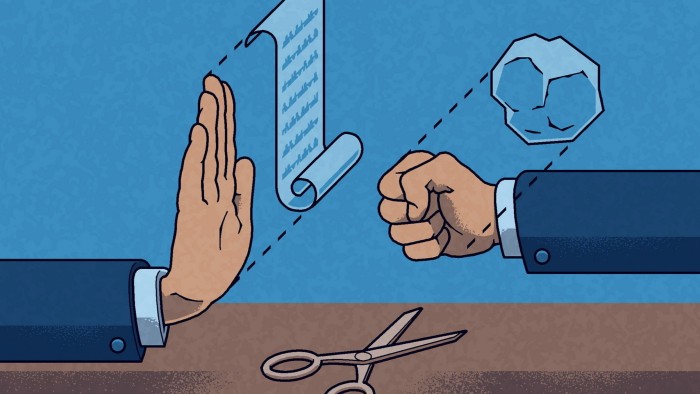Unlock the White House Watch newsletter for free
Your guide to what the 2024 US election means for Washington and the world
Amazing as it seems, there is good news from America — the courts are working. Late last week, a federal judge gave a temporary order restricting Elon Musk and his band of techno-libertarians, the so-called Department of Government Efficiency (Doge), from accessing US Treasury plumbing, saying there was a risk of irreparable harm.
The lawsuit was brought by 19 attorneys-general and a longer legal battle will now unfold. But the fact that the court granted the order so quickly is important. Among all the worrisome things that the Trump administration is trying to do — from freezing foreign aid and domestic grants, to dismantling USAID (which is almost certainly constitutionally illegal) to ending birthright citizenship and firing federal employees who disagree with them — the Doge takeover of Treasury is one of the scariest.
Compared with this, even Trump’s tariff threats are a sideline. Within his first week in office, Treasury secretary Scott Bessent handed over the keys to the inner workings of America’s financial system to Musk after placing the highest ranking career Treasury official, David Lebryk, on leave. He had refused to give Doge-affiliated individuals full access to the department’s data and the computer systems that house them.
That means that Musk got access to the most sensitive personal data for every American taxpayer. As yet another case around the same issue, brought by the Alliance for Retired Americans, the AFL-CIO and the SEIU (two large unions), says: “The scale of the intrusion into individuals’ privacy is massive and unprecedented.” Names, social security numbers, tax data, bank account data, credit and debit card numbers and more are held in Treasury records to allow secure transfers between the public and government.
There are many things that could be done with this information, from the nefarious (sending the Internal Revenue Service to audit people you don’t like), to the opportunistic (the ability to modify financial transactions or payment routing, or freeze payments), to the defensive (the ability to decide which entities would be paid or not in the case of a situation like a budget shortfall or a debt ceiling crisis).
Then there are the ways in which access to Treasury data could allow Musk unfair business advantages. Privileged access to such data would conceivably allow him or people within his companies and circle to front-run major Treasury transactions, or get insider information on government spending in key industries like defence, energy, healthcare and technology.
The modification of existing software systems (which might include the implementation of artificial intelligence) obviously poses huge national security and geopolitical risks, particularly given Musk’s close business ties to China.
But I imagine that blacklisting political opponents, business rivals, or groups that Doge deems problematic at home would be the low-hanging fruit. After all, Musk himself has already said on X that “the @DOGE team is rapidly shutting down” payments to groups, including the Lutheran Family Services and affiliated organisations, that the Trump administration doesn’t like.
Unauthorised access by non-government officials to such information is unlawful and may even be criminal. Most of the lawyers I have spoken to over the past two weeks working on cases against the administration and Doge say that the lawbreaking is so extreme that one of the biggest challenges is sorting through the hierarchy of illegalities.
But the overriding issue here is that this kind of control of the Treasury — which processes over $6tn annually in transactions including social security payments, tax refunds, federal grants and military salaries — is something that historically, only monarchs and autocrats have had. As Alex Karp, the CEO of Palantir, which has seen its stock price surge on the promise of lucrative government contracts, said last week: “This is a revolution . . . some people will get their heads cut off.”
The rapid Doge takeover of federal infrastructure, and many of the comments from Musk, have eerie similarities to the ambitions of the neo-reactionary movement or NRx, a creepy philosophy developed by a software engineer named Curtis Yarvin, and embraced by members of the Silicon Valley elite (including Peter Thiel, Balaji Srinivasan and Marc Andreessen). The philosophy is also known — wait for it — as “Dark Enlightenment”.
These folks, who seem to have read too much Ayn Rand, believe freedom and democracy are incompatible, and what America really needs is a CEO monarch. They don’t want to make government more efficient so much as they want to privatise it.
It should be the stuff of science fiction. But it isn’t.
What to do? Keep getting those restraining orders. As ambassador Norm Eisen, one of the many lawyers filing multiple cases against the administration told me: “We are meeting Donald Trump’s autocratic shock and awe with democratic rule-of-law shock and awe.” Here’s hoping the latter wins out.
Read the full article here




